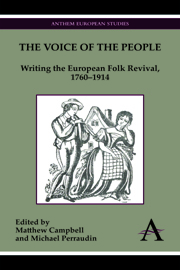Book contents
- Frontmatter
- Table of Contents
- List of Figures
- Introduction
- Chapter 1 The Impact of Ossian: Johann Gottfried Herder's Literary Legacy
- Chapter 2 On Robert Burns: Enlightenment, Mythology and the Folkloric
- Chapter 3 The Classical Form of the Nation: The Convergence of Greek and Folk Forms in Czech and Russian Literature in the 1810s
- Chapter 4 Literary Metamorphoses and the Reframing of Enchantment: The Scottish Song and Folktale Collections of R. H. Cromek, Allan Cunningham and Robert Chambers
- Chapter 5 Thomas Moore, Daniel Maclise and the New Mythology: The Origin of the Harp
- Chapter 6 The Oral Ballad and the Printed Poem in the Portuguese Romantic Movement: The Case of J. M. da Costa e Silva's Isabel ou a Heroina de Aragom
- Chapter 7 Class, Nation and the German Folk Revival: Heinrich Heine, Georg Büchner and Georg Weerth
- Chapter 8 The Estonian National Epic, Kalevipoeg: Its Sources and Inception
- Chapter 9 The Latvian Era of Folk Awakening: From Johann Gottfried Herder's Volkslieder to the Voice of an Emergent Nation
- Chapter 10 From Folklore to Folk Law: William Morris and the Popular Sources of Legal Authority
- Chapter 11 Pioneers, Friends, Rivals: Social Networks and the English Folk-Song Revival, 1889–1904
- Chapter 12 The Bosnian Vila: Folklore and Orientalism in the Fiction of Robert Michel
- Epilogue: The Persistence of Revival
- Bibliography
- Index
- List of Contributors
Epilogue: The Persistence of Revival
Published online by Cambridge University Press: 05 July 2012
- Frontmatter
- Table of Contents
- List of Figures
- Introduction
- Chapter 1 The Impact of Ossian: Johann Gottfried Herder's Literary Legacy
- Chapter 2 On Robert Burns: Enlightenment, Mythology and the Folkloric
- Chapter 3 The Classical Form of the Nation: The Convergence of Greek and Folk Forms in Czech and Russian Literature in the 1810s
- Chapter 4 Literary Metamorphoses and the Reframing of Enchantment: The Scottish Song and Folktale Collections of R. H. Cromek, Allan Cunningham and Robert Chambers
- Chapter 5 Thomas Moore, Daniel Maclise and the New Mythology: The Origin of the Harp
- Chapter 6 The Oral Ballad and the Printed Poem in the Portuguese Romantic Movement: The Case of J. M. da Costa e Silva's Isabel ou a Heroina de Aragom
- Chapter 7 Class, Nation and the German Folk Revival: Heinrich Heine, Georg Büchner and Georg Weerth
- Chapter 8 The Estonian National Epic, Kalevipoeg: Its Sources and Inception
- Chapter 9 The Latvian Era of Folk Awakening: From Johann Gottfried Herder's Volkslieder to the Voice of an Emergent Nation
- Chapter 10 From Folklore to Folk Law: William Morris and the Popular Sources of Legal Authority
- Chapter 11 Pioneers, Friends, Rivals: Social Networks and the English Folk-Song Revival, 1889–1904
- Chapter 12 The Bosnian Vila: Folklore and Orientalism in the Fiction of Robert Michel
- Epilogue: The Persistence of Revival
- Bibliography
- Index
- List of Contributors
Summary
In Chapter 4 of this book, Sarah Dunnigan quotes the English philosopher of history R. G. Collingwood on the enchantments of fairy- and folk-lore: ‘our national fairy tales are actual surviving fragments of our national youth and by steeping ourselves in them we live that youth over and over again’. Fairy tales and the lore of the folk express wholeness and unity, and are thus representative of the continuity of the self into adulthood and the re-enactment of childhood. The ‘steeping’ of self and society in the national tale enables the reliving of ‘national youth’, and is a vital part of how societies conceive of themselves in history as well as poetry, psychic reminders of survival and continuity.
Collingwood was writing in the 1930s about the Grimms' Kinder- und Hausmärchen, and more generally on what we in our introduction to this book have called the ‘Germano-British’ basis of European folk revivals after Macpherson and Herder. He was also writing in a decade which brought to crisis the attempts of various European nationalisms to authenticate ideologies of national origins in the singularities of the differing lore of their differing folk. For Collingwood these were among the ideas which animated the ‘new barbarians’. His editor, Philip Smallwood, then asks why a respected archaeologist, classicist and aesthetician would write about folklore in this decade; but by the beginning of the 1940s one answer was clear.
- Type
- Chapter
- Information
- The Voice of the PeopleWriting the European Folk Revival, 1760–1914, pp. 201 - 206Publisher: Anthem PressPrint publication year: 2012



